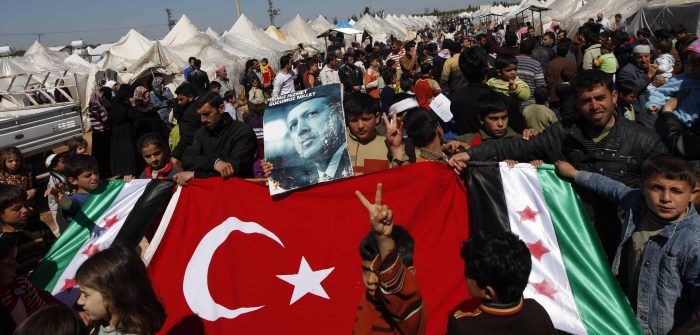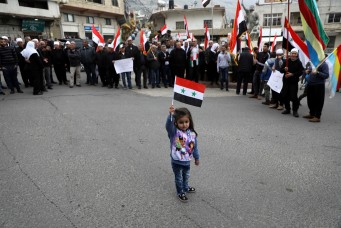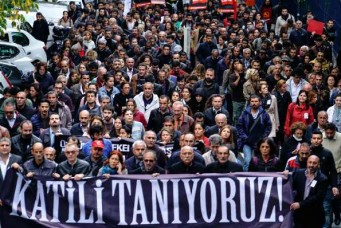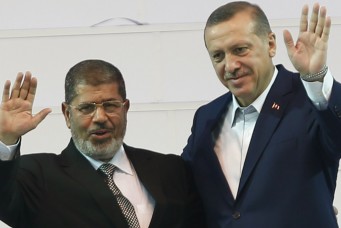Erdoğan’s Achilles Heel
President Recep Tayyip Erdoğan’s policy toward Syrian refugees could become his downfall as anti-refugee sentiment in Turkey grows, especially if the economy weakens.

Syrian children display a poster of Turkey’s President Recep Tayyip Erdoğan at the Reyhanli refugee camp, Hatay province, the Turkish- Syrian border, March 18, 2012. Murad Sezer/Reuters
One of the greatest challenges the Syrian conflict has posed to Turkey has been the influx of over three million refugees. A country that has never considered itself a nation for non-Turkish migration has become a destination for Arab refugees from Syria in a matter of years. After having done a remarkable job at welcoming so many refugees, the Turkish government now has to tackle the challenges of integrating them in a country that has become increasingly nationalist and skeptical of foreigners.
Turkey’s President Recep Tayyip Erdoğan has been riding a nationalist wave since the ceasefire between Turkey and the Kurdistan Workers’ Party or the PKK broke down in 2015 and the conflict between Kurdish separatists and the Turkish government reignited. The support many Turkish nationalists have lent to Erdoğan—originally an Islamist politician—changed Erdoğan’s political fortunes in 2015 during snap elections that were held a few months after Erdoğan’s Justice and Development Party (AKP) lost its parliamentary majority.
Erdoğan’s alliance with the Turkish nationalists once again proved critical in June 2018’s presidential and parliamentary elections, granting Erdoğan the presidency and a parliamentary majority. Yet, the alliance is not without challenges and may be fraught with danger for the Erdoğan government in the future.
A potential flashpoint is the Erdoğan government’s policy vis-à-vis the Syrian refugees. The ruling AKP has pursued an open-border policy after the conflict in Syria started, allowing a large number of refugees to cross into Turkey. It immediately extended generous assistance, providing protection and “five-star” services in the refugee camps. The camps have primary and secondary schools, community centers, playgrounds and supermarkets. The refugees have been given refrigerators and stoves, in some cases TVs and air-conditioners. Refugees have been provided cash cards and a monthly allowance. Most Syrian refugees living outside the camps continue to survive on Turkish government largesse.
The government’s generous efforts to help the refugees have won it praise internationally, but they are creating a nationalist backlash at home. The resentment against refugees among the Turkish populace is growing. A majority of Turks, especially the nationalists, see refugees as competitors for government assistance, an economic burden, a security threat, and a danger to the ethnic makeup of the country.
Turkish nationalists are likely to turn against Erdoğan in future elections if an economic downturn exacerbates this anti-refugee sentiment. Erdoğan has long managed to contain the negative electoral effects of the large influx of refugees by employing a “Muslim solidarity” rhetoric. He has pushed the idea that Turkish citizens—the majority of whom are Sunni Muslim—should help their Sunni Muslim brothers and sisters in need.
However, real-life challenges and anxiety over the ethnic makeup of the country seem to have trumped Sunni Muslim solidarity. While Erdoğan and his party won the most recent elections, the AKP lost votes to the Nationalist Action Party (MHP) in the June 2018 elections. The unexpected rise in the nationalist party’s support is likely due to the growing frustration within the AKP’s base over the Syrian refugees. These low-income, nationalist segments of the AKP apparently voted for the MHP partly because the MHP has been critical of the AKP’s refugee policy. All of this poses a major dilemma for Erdoğan. He has to walk a fine line between integrating the millions of Syrian refugees who are in Turkey to stay and doing so without alienating his own base.
Syrian Migration to Turkey
Turkey’s initial response to the flow of Syrian refugees in 2011 focused on providing humanitarian aid and establishing refugee camps in the border provinces—measures which assumed the Syrian refugees’ stay would be short and temporary. The Turkish government did this via the Disaster and Emergency Management Authority, a government agency which provided refugees with health centers, food, education facilities, and social areas. However, as the conflict in Syria became a long and bloody affair, Turkish officials came to recognize that reforming the existing system to better address the condition of the Syrian refugees had become a necessity.
The Law on Settlement, established in 1934 and updated in 2006, enabled Turkey to become a temporary home for refugees and asylum seekers but restricted the right of permanent settlement—which leads to citizenship—only to persons of Turkish descent and culture. In April 2013, the Turkish parliament passed the Law on Foreigners and International Protection (LFIP) which established a legal framework for protecting and aiding asylum seekers. The LFIP established the Directorate General for Migration Management (DGMM), an executive-branch agency tasked with migration management and overseeing the implementation of the new legal provisions.
In 2014, Turkey issued new regulations that granted Syrian refugees secure legal status in the country for the first time. This new regulation provided ID cards and granted them access to services such as healthcare and education.
However, the Temporary Protection Identity Card (TPID) has not allowed refugees to work or move without prior authorization. Cardholders can apply for humanitarian aid provided by some organizations to the poor, and refugee cardholders have access to hospitals and free medical treatment. Yet, aside from these steps, the government has taken to meet the newcomers’ basic needs, the refugees still do not have official refugee status, which would entitle them to a broader array of benefits like housing, public relief, and various social services. The Turkish government has allowed them to apply for work permits but only about 1 percent of the working-age refugee population has received the permits and the rest have entered Turkey’s informal economy. Education is equally problematic with almost half the school-age Syrian children who live outside the camps unenrolled.
Taking steps to offer long-term solutions to these problems requires recognizing that refugees are in Turkey to stay, but the Erdoğan government fears a domestic backlash if it were to openly admit that Syrians will not be returning home.
The Sunni Muslim Narrative and EU Negotiations
Beginning in May 2013, Erdoğan and the AKP promoted a narrative of Sunni Muslim solidarity to contain negative public reactions to the Syrian refugees in Turkey. The AKP pushed the idea that Turkish citizens should help fellow Muslim brothers and sisters in need. President Erdoğan called the refugees escaping the “tyranny of the Syrian regime” muhacir, or religiously oppressed, a term used originally to refer to the first Muslims who had to migrate with the Prophet Mohammed from Mecca to Medina in order to escape religious persecution.
Erdoğan and his publicists called escaped Syrian Sunni Muslims “religiously oppressed” because Al-Assad and leading members of his regime are Alawite Shia and the sectarian divide between the Shia and Sunnis of Syria was an important division in the Syrian civil war. Consequently, Erdoğan referred to the Turkish citizens who welcomed Syrian refugees as ensar, a word connected to the local people of Medina who welcomed the Prophet Mohammed and his followers and helped them.
Erdoğan first used the narrative of a fraternal Sunni–Muslim union between Turks and Syrians after a double car bombing that killed fifty-one people on May 11, 2013 in Reyhanlı, Turkey, a town on the Syrian border. Reyhanlı was an entry-point for Syrian refugees fleeing the conflict into Turkey, and local Turks quickly blamed the refugees for the bombing while the government blamed the Al-Assad regime. In a speech President Erdoğan delivered shortly after the incident, he said, “Brothers, you have opened your arms to our 25 thousand siblings from Syria. Now, do not pay heed to those who strive to expel them from here. They are part of our [religious] fraternity. They came here because they trust and believe us [….] We will be ensar, we will open our arms, we will never give credence to this discord and unrest.”
The Erdoğan government continues to employ this narrative when it wants to galvanize Turkish support against the EU, stressing that Western leaders have shown no care for Syrian refugees. To a point, this tactic resonates well among the Turkish religious–nationalist right. Erdoğan has also leveraged the refugees as a negotiating tool in his government’s relations with the European Union.
In 2015 and 2016, the EU experienced the unprecedented influx of refugees—many of whom were Syrian—posing institutional and political challenges to European governments. European leaders started working on a deal with Turkey to stop the migration flow into Europe, giving Ankara significant leverage over the EU. The EU countries signed the refugee deal with Turkey in March 2016. Under the agreement, Turkey agreed to take back Syrian migrants who had reached Greece illegally. In return, legal Syrian refugees were accepted into the EU. Since return procedures in Greece are slow, only 1,564 Syrians were sent back to Turkey between 2016 and 2018.
In exchange, around 12,000 Syrians from Turkey have been resettled in EU countries. European countries hoped that sending the refugees back to Turkey would dissuade them from crossing the sea. In return, the EU would grant visa-free travel to Turkish citizens, provide financial aid to Turkey, and accelerate Turkey’s membership process into the EU.
The deal has limited the number of “irregular migrants” and Turkey has received financial support from the EU for taking in a large share of Syrians. Yet, the deal has been widely criticized for giving Erdoğan significant leverage over the EU when it came to muffling European leadership’s criticism of human rights abuses under Erdoğan and the AKP. Indeed, even before the signing of the deal, the European Union was reluctant to upset Ankara. In 2015, for example, the European Union decided to delay publication of a critical report on Turkish democracy until after the Turkish election in November 2015 as a way to keep the Erdoğan government in Ankara placated and friendly.
Since signing the EU refugee deal, the Turkish government has used the deal to extract concessions from Europe. After the failed coup in Turkey in the summer of 2016, the European Union increased its criticism of Turkey citing concerns over the government’s increasing crackdown on media and Kurdish politicians. The European Parliament urged governments to freeze EU accession talks with Turkey. In response, Erdoğan threatened to tear up the refugee deal. Turkey threatened again to end the EU refugee pact when Greece’s Supreme Court in January 2017 ruled against extraditing Turkish soldiers who had fled to Greece after the failed coup attempt against Erdoğan. In April 2017, Turkey once again used the deal to pressure Western governments when Germany and the Netherlands refused to allow Turkish politicians to campaign with the Turkish diaspora population in those countries for a referendum to give Erdoğan more power.
Despite government efforts, the anti-refugee sentiment has been growing in Turkey, even among AKP supporters, forcing the Erdoğan government to change its narrative. For example, in 2016, President Erdoğan announced that Syrian refugees living in Turkey could eventually be granted citizenship. Erdoğan’s pledge sparked a reaction across social media. A Turkish hashtag against Syrian migrants became one of the trending topics worldwide on Twitter. Afterwards, the government clarified that only educated Syrians who can contribute to the Turkish economy would be granted Turkish citizenship.
Seemingly bowing to the growing popular opposition to Syrian refugees in February 2018, Erdoğan said he wanted the Syrian refugees to return to their country. He proposed that they be sent to northern Syria where the Turkish military and allied Syrian fighters were conducting a military maneuver called Operation Olive Branch to capture territory from the Syrian Kurds. Turkish Prime Minister Binali Yildirim said that as many as 350,000 refugees could be relocated to Syria’s Afrin enclave alone. Yet, to date, no major movement of Syrians returning from Turkey to Syria has occurred.
Public Perceptions
According to a recent public opinion poll conducted by Istanbul’s Bilgi University in 2018, 86.2 percent of respondents said Syrians should go back to Syria after the war is over, a big change from when only 38.9 percent of Turks polled agreed with that statement.
With around 3.5 million unemployed Turkish citizens and double-digit inflation, many people see the refugees as an economic burden. Reportedly agricultural and unskilled construction workers have been particularly hard hit by Syrian refugees working in the Turkish informal sector. In cities such as Mersin and Adana—where Kurds used to make up the bulk of seasonal workers—many Kurds are now losing their jobs to Syrians. Working-class Turkish citizens complain that the Syrians are receiving aid from the government while the Turkish citizens are receiving second-class treatment from Turkish bureaucracy.
The difference in culture and lifestyle between Syrians and Turks has also increased the tension between the refugees and the locals, especially in border towns with conservative local cultures. These towns have seen an increase in polygamy and divorce rates. Turkish men, be they young or old, single or married, have been reportedly marrying young Syrian refugee women in large numbers. Local Turkish women feel threatened by these marriages and blame the Syrian women “for deceiving their husbands.” The rapidly changing demographics in those border towns exacerbate the feeling of insecurity and erosion of local culture among the host community.
The “cultural clash” between the two communities is also prevalent in the metropoles in the West. As Syrian refugees cluster with compatriots, they form parallel societies segregated from the local Turkish population. This segregation not only prevents integration but also increases the hostility between the two communities. Turks complain that the Syrians have no intention of adapting to their new lives in Turkey and some Turks claim that Syrian refugees are dangerous or prone to violence.
Turks who are opposed to Erdoğan see his decision to grant citizenship to some Syrian refugees as a political move to consolidate his power. More than 1.5 million refugees will be eligible to vote if granted citizenship. Many Syrian refugees appreciate President Erdoğan’s efforts to provide food, shelter, and services to their community. Many of these Syrians are expected to vote for him, if they become citizens. Erdoğan’s opponents argue that by pledging citizenship to the Syrian refugees, he wants to grow his support base ahead of elections.
There are also concerns about the “Sunnification of society” centered around Erdoğan’s rhetoric of Sunni Muslim brotherhood between Turkish citizens and Syrian refugees. The secularist segment of the Turkish population fears that Erdoğan is advancing his religious/sectarian agenda with his embrace of Syrian refugees. By settling them in opposition neighborhoods, they think Erdoğan is trying to marginalize secularist Turks both politically and culturally.
Until recently, public concerns over the refugees have not become part of a national debate largely due to the government’s control over media and the opposition’s unwillingness to pick up the issue to shore up votes. That has changed. The opposition parties and Turkish citizens are now criticizing the government’s domestic Syrian refugee policies.
The Opposition’s Stance
Opposition parties blame what they see as the government’s misguided Syria policy for the presence of over three million Syrian refugees in Turkey. The issue became a hot campaign topic ahead of the June 24 presidential and parliamentary elections. Muharrem Ince, the presidential candidate of the main opposition Republican People’s Party (CHP), criticized Erdoğan for allowing thousands of Syrian refugees to visit Syria for the Muslim holiday of Eid Al-Fitr and then return to Turkey. He argued that if the Syrian refugees could go home to visit, they could go home to stay. Ince’s rhetoric resonates particularly well within his secularist and Alevi base, which fears the Sunnification of Turkey.
The ultranationalist MHP performed much better than expected in the June elections, capturing 11 percent of the vote at a time when the party faced mass resignations and the challenge of a splinter party, the Iyi Parti. It is likely that some of the disgruntled AKP voters who disapprove of the government’s generous refugee policy switched to the MHP.
The Iyi Party, which broke with the MHP and entered the parliament after becoming part of an opposition electoral coalition, also appealed to nationalists’ concerns over Syrian refugees. The party leader, Meral Akşener, vowed to repatriate the Syrian refugees if elected president.
The pro-Kurdish Peoples’ Democratic Party (HDP) reflects the worry within its own constituency. Kurds argue that by settling Sunni Arab Syrians in the Kurdish and Alevi majority areas of Turkey’s Southeast, the Erdoğan government is trying to change their home provinces’ demographics. There is also worry that the jihadi elements within the Syrian refugee community pose a security threat to the Kurds.
The Islamic State has not only targeted the Kurds in Syria but also killed many in Turkey. In 2015, IS targeted several Kurdish rallies, killing scores of people.
Possible Achilles Heel: Refugees and a Weakening Economy
The politicization of the refugee issue has forced Erdoğan’s hand in recent elections. Given that the overwhelming majority of Turkish citizens, including the AKP base, are opposed to the Syrian refugees, the issue will cause further trouble for Erdoğan. It is important to stress that the AKP lost some votes to MHP in the June 2018 elections due to his government’s Syrian refugee policies. The fact that the AKP lost votes to its political ally MHP does not bode well for Erdoğan’s party, or the political alliance that has kept the AKP in power since 2015. Changes can indeed come quickly in politics, and flawed domestic policies are often the reason for sudden reversals in political fortunes.
The debate on the Syrian refugees may become exacerbated by a weakening Turkish economy. Turkey has high unemployment and recently faced a currency crisis with the Turkish lira plunging sharply against the U.S. dollar in the spring of 2018. At the time, inflation was already running high. The drop in currency pushed prices up even higher. Experts say the country might be on the verge of a financial crisis.
An economic downturn will further strengthen anti-refugee sentiment in the country, particularly in the low-income areas that form the backbone of the AKP’s base. As such, Erdoğan and his party are now increasingly vulnerable to a push by Turkish nationalists to address the growing concerns of the electorate.
Yet changing course on the Syrian refugee crisis is no easy task. Simply put, Syrians are in Turkey to stay. Erdoğan has to take steps to integrate the Syrians politically, economically, and socially to prevent further clashes in the country. Doing this without alienating his nationalist allies—whose support he heavily relies on to maintain his parliamentary majority—might prove to be Erdoğan’s toughest task ever. His Syrian refugee policy might undo his alliance with Turkey’s nationalists and become his Achilles heel.
Gönül Tol is the founding director of The Middle East Institute’s Center for Turkish Studies, and professor at George Washington University’s Institute for Middle East Studies. She previously taught at the College of International Security Affairs at the National Defense University. She has been published in Foreign Affairs, Foreign Policy, the Wilson Center, and the Washington Institute, among others. On Twitter: @gonultol.




